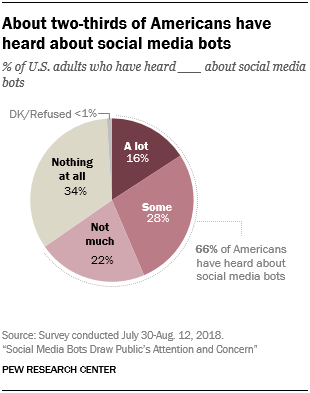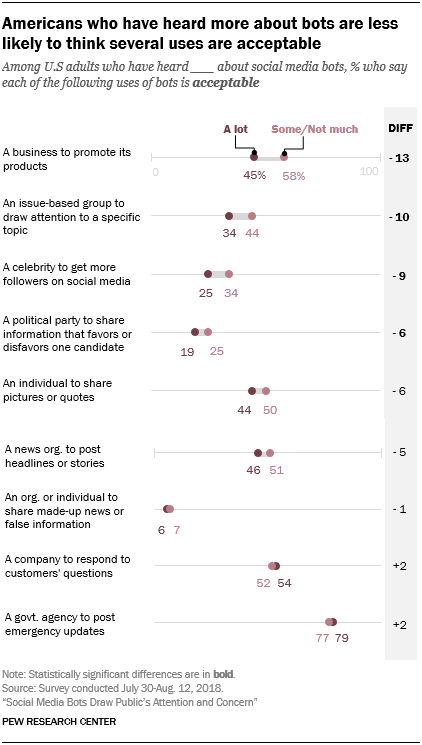“Social Media Bots Draw Public’s Attention and Concern” (New Survey Findings From Pew Research)
From Pew Research:
A Pew Research Center survey finds that social media bots – accounts that operate on their own, without human involvement, to post and interact with others on social media sites – have drawn the attention of much of the public.
About two-thirds of Americans (66%) have heard about social media bots, though far fewer (16%) have heard a lot about these accounts. Among those aware of the phenomenon, a large majority are concerned that bot accounts are being used maliciously, according to the survey, conducted July 30-Aug. 12, 2018, among 4,581 U.S. adults who are members of Pew Research Center’s nationally representative American Trends Panel. Eight-in-ten of those who have heard of bots say that these accounts are mostly used for bad purposes, while just 17% say they are mostly used for good purposes.
These findings follow recent Congressional hearings and investigations by social media sites and academic researchers that have suggested social media bots as one factor in the spread of misinformation. And since the 2016 U.S. presidential election, many Americans have expressed concern about the presence of misinformation online, particularly on social media.
Among the key findings:
While many Americans are aware of the existence of social media bots, fewer are confident they can identify them. About half of those who have heard about bots (47%) are very or somewhat confident they can recognize these accounts on social media, with just 7% saying they are very confident. In contrast, 84% of Americans expressed confidence in their ability to recognize made-up news in an earlier study.
When it comes to the news environment specifically, many find social media bots’ presence pervasive and concerning. About eight-in-ten of those who have heard of bots (81%) think that at least a fair amount of the news people get from social media comes from these accounts, including 17% who think a great deal comes from bots. And about two-thirds (66%) think that social media bots have a mostly negative effect on how well-informed Americans are about current events, while far fewer (11%) believe they have a mostly positive effect.
While the public’s overall impression of social media bots is negative, they have more nuanced views about specific uses of these accounts – with some uses receiving overwhelming support or opposition. For example, 78% of those who have heard about bots support the government using them to post emergency updates, the most popular usage of the nine asked about in the survey. In contrast, these Americans are overwhelmingly opposed to the use of bots to post made-up news or false information (92%). They are also largely opposed to bots being used for political purposes and are more split when considering how companies and news organizations often use bots.
The margin of error for the full sample of 4,581 respondents is plus or minus 2.4 percentage points.
Direct to Complete Report
Direct to Methodology
Filed under: Associations and Organizations, News
About Gary Price
Gary Price (gprice@gmail.com) is a librarian, writer, consultant, and frequent conference speaker based in the Washington D.C. metro area. He earned his MLIS degree from Wayne State University in Detroit. Price has won several awards including the SLA Innovations in Technology Award and Alumnus of the Year from the Wayne St. University Library and Information Science Program. From 2006-2009 he was Director of Online Information Services at Ask.com.




